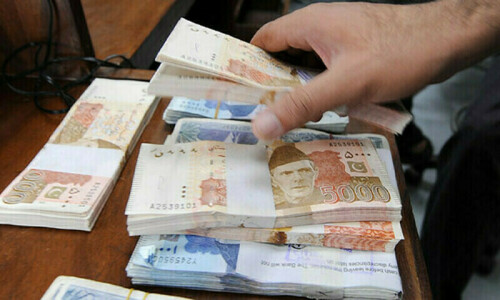WASHINGTON, May 11: No United States troops are stationed in Pakistan’s tribal areas, Interior Minister Moinuddin Haider said here on Friday afternoon.
The minister made the emphatic claim at a news briefing with Washington-based Pakistani journalists shortly before leaving for Pakistan after cutting short a visit to the US in view of the situation created by the Karachi suicide bombing.
He had come to Washington to take part in Wednesday’s inaugural meeting of the Pakistan-US joint force on counter-terrorism and law enforcement, and met Attorney-General John Ashrcoft and Undersecretary of State Richard Armitage.
The minister said no permission had been given to any US troops to operate in Pakistan territory, and Islamabad considered looking for Al Qaeda or Taliban fighters in the country as its own responsibility, which it was carrying out with its own resources; if Pakistan authorities felt they lacked in anything, they would seek assistance. “Pakistan soil would not be used for the stationing of foreign troops.”
The US has already pledged a $73-million package for law enforcement, surveillance and anti-narcotics operations on Pakistan’s western border with Afghanistan, of which $45 million is meant to aid ground forces and the rest will be given in the form of fixed-wing aircraft and helicopters. An additional $3 million has been promised for Sindh to revamp the provincial police and security apparatus. US assistance will be sought for the setting up and modernization of fingerprinting and DNA testing facilities.
Haider also said Pakistan had provided US authorities with a list of 45 Pakistanis detained in America following the September events, and “we expect justice and better treatment” for them.
He confirmed that an inter-agency team from Pakistan would visit the US detention centre at Guantanamo Bay, Cuba, to investigate the Pakistanis held there and seek their release.
The minister did not specify a number for the Guantanamo Bay captives, but it is generally believed that they number close to two dozen. The Pakistani team is due to arrive this month.
He was closely questioned on perceptions in the American media, as reflected in comments and in reports from US journalists in Pakistan, that the military government was not doing enough to control sectarianism and militancy. He gave facts and figures to establish a high rate of conviction for sectarian-related cases of terrorism, and said more than 300 persons had been arrested after the Karachi suicide bombing in which several French nationals were killed. All the arrested persons are on a most-wanted list.
He said people who were arrested as suspects but had no specific charges against them could not be held beyond three months. He decried the general tendency to blame a foreign hand for every incident, saying that while this could be true in the case of the random bombings that took place throughout Pakistan, in many cases those arrested had themselves proudly claimed that they had carried out their acts of terrorism and told police they did not want to give credit to India for their actions.
On militancy, Haider referred to the steps taken to ban the Jaish-i-Mohammad and Lashkar-i-Tayyaba, and said while Pakistan had taken several measures to curb extremism, foreign powers should also ask India to clean up its house. The Gujarat carnage showed the hold of religious extremism and communalism in that country. India kept on harping on “cross-border terrorism,” but it should permit foreign journalists to visit Kashmir and agree to strengthen the United Nations military observers group, and then the truth would come out.
The minister said the culture of militancy had nurtured for over two decades and the thinking behind it could not be changed overnight because of a single speech. During his talks with US officials, the question of seeking the extradition of some Pakistanis was also taken up. Haider said Pakistan wanted seven or eight people to be handed over to it, but declined to give names.















































Dear visitor, the comments section is undergoing an overhaul and will return soon.